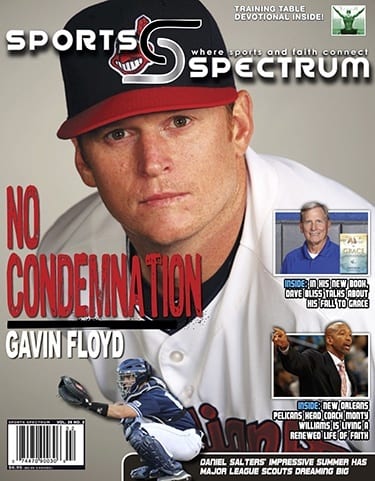 Was this what Christianity was all about?
Was this what Christianity was all about?
Feeling crappy about yourself all of the time?
Because that was exactly how Gavin Floyd felt.
At 25 years old, on top of the world professionally and financially—pitching for the Chicago White Sox—Floyd says he surrendered his life to God. His attempts to satisfy his baseball ambition had proved to be futile, and he was searching for something with true meaning—true purpose and fulfillment. This was 2009, and he hoped the God of the Bible could help him start anew.
At the time, Floyd never could have imagined his newfound faith—something he was told would bring ample joy and security—would cause him to experience such depths of anxiety and despair. But that’s exactly what happened.
The two years following his “conversion” ultimately became two of the most depressing years of his life. He felt worthless, scared and anxious—each emotion stemming from his faith.
This Jesus he had surrendered to was supposed to give him “life to the full”—yet Floyd had never lacked so much life.
The Cycle
The reality is that Floyd was unprepared for the difficulties and challenges the “Christian life” presented him.
First, he was bringing years worth of struggles into this “new life” he was attempting to live.
Addictions. Habits. Tendencies.
Second, like many Christians, his natural solution for fixing these things was to work harder and, quite simply, live up to the expectations he had for himself.
This led him nowhere. He failed again and again and thus felt worse and worse about his performance before God. His expectations, combined with his inability to shake off the shackles of his past addictions, thrust him into an exhausting cycle.
“You just felt like you were on a roller coaster of performance,” Floyd says. “Pleasing, displeasing; pleasing, displeasing; losing, then trying to earn it back. It was like I was trying to prove myself to Him but just kept falling.”
Upon making one of the biggest decisions of his life, Floyd’s attempts to “live out” the Christian life had left him depressed, anxious and confused.
“A lot of people in church are on the performance wheel,” says Floyd’s mentor, Mickey Weston, Chicago White Sox chaplain and executive director at Unlimited Potential, Incorporated (UPI). “And when people get tired, you know what they do? They abandon their faith.”
If Floyd had decided to abandon his faith, could you blame him? No one should have to wrestle with such intense feelings of worthlessness.
Floyd tried everything, hopping from one solution to another, making conscious efforts to make God his No. 1 priority. He had the will to do so, the desire to do so, but his actions mirrored the Apostle Paul’s in Romans 7:15: “I do not understand what I do. For what I want to do I do not do, but what I hate I do.”
This cycle of striving left him grappling for answers.
“I ended up isolating myself from guys I used to hang out with and trying not to do what I used to do with them,” Floyd says. “I was becoming a Pharisee…For some reason I felt like when I failed I lost my salvation, then, ‘Oh, I’m getting back, I’m getting back, getting focused and praying,’ and then you mess up again. I had this weight on my shoulders about trying to perform for God. I was trying to be perfect, but I couldn’t do it.”
Salvation, it seemed, had only left him in the pits of despair and self-loathing.
“Talk about not enjoying life at all,” Floyd says.
Was this what Christianity was all about?
Enduring a lifetime of hell to get to heaven?
“You didn’t see light in his eyes; you didn’t see a hop in his step,” Weston says. “It was kind of like he was carrying this ball and chain around with him. He was just beating himself up because he wanted deeply to follow Christ, and yet his eyes and his focus were on his sin.”
Freedom
Floyd is not alone in this struggle.
In author Brennan Manning’s book, Abba’s Child, he says that one of the biggest tragedies in the church today are the immense feelings of guilt and shame that define the beloved sons and daughters of God.
“The majority of the church right now is still trying to do the ten commandments—‘If I do my quiet time, if I pray, if I go to church, I’m okay’—but God wants a vital relationship with us to the point where everything flows from Him,” Weston continues.
Was there a solution, a cure? Or would there always be feelings of guilt and shame and worthlessness? Did this explain why most Christians were miserable?
“I just felt like, for the lack of a better phrase, a piece of crap,” Floyd continues. “I just never thought that I was worthy. I always felt like I was insufficient.”
In 2011—after two straight years of beating himself up, struggling to sleep, sweating in bed, and being a “miserable person to be around”—Floyd read a book titled The Cure: What If God Isn’t Who You Think He Is And Neither Are You? by John Lynch, Bruce McNicol and Bill Thrall.
Turns out, God wasn’t who Floyd thought He was.
“That book was very instrumental in my life,” Floyd says, “because I learned that I was justified in Christ. A huge light bulb came on. That was enormous to me. He loves me through these things I struggle with…I felt free to live, free to live for Him without condemnation, guilt, and shame…I guess I didn’t understand the full gospel until then. Justification is so deep. You read Romans, and it’s just so rich with justification. I was just like, ‘Thank you, thank you, thank you.’”
As Floyd learned, God wasn’t the grumpy Father on His throne, shaking His finger and scoffing every time Floyd messed up; He wasn’t the angry judge, slamming His hammer and delivering punishments each time Floyd neglected his Bible or struggled with a sin he was trying to conquer. God, rather, was the gentle, loving Father in the Parable of the Lost Son, His arms wide open, inviting both His rebellious son and prideful son to a great banquet, where they could be lavished in His grace and changed by it—where they could be home and feel loved. God was not irritated with him, reading through his list of sins, keeping a tally of all the times he messed up; rather, God was whispering to him, “Gavin, you are justified; you are clean; you are new.”
“When Peter denied Christ three times and the cock crowed, and Jesus looked at Peter, what did that look like?” Weston asks. “Was it one of disappointment or was it one of, ‘It’s okay Peter’? I think that for most believers, if you ask them what their view is of that look from Jesus, they would believe it is a look of disappointment. But I think they are projecting upon Jesus something that wasn’t there. I believe it was one of, ‘It’s okay Peter. It’s going to be alright.’ I think it was one of love—not disappointment.”
This ability to “accept his own acceptance,” as Brennan Manning calls it, strengthened Floyd in his battles with sin because he was already rooted in God’s love. His foundation was secure. His truest self, one who was loved by the Almighty, was within him.
“I think that the deeper our intimacy goes with Christ, the easier it is to understand that He loves us unconditionally,” Weston continues. “I talked to Gavin a lot about spiritual breathing—the exhale is the confession of the sin, agreeing with the Lord that it is sin; the inhale is accepting that forgiveness. There is a desire to change, but it is a process. As a young believer, you feel like you are in a wind sprint. Exhale, inhale, exhale, inhale, exhale, inhale. Because you are having sin revealed to you that you never knew was sin.”
Weston says that the steps Floyd took to shed the sin and addictions that had followed him throughout his life would be considered radical by most.
“That guy, I’m telling you, more than any ball player I’ve ever been associated with, made changes in his life because he wanted the depth of that relationship,” Weston says.
It was no longer about performing to earn God’s favor. He already had God’s favor (justification)—now it was just about enjoying God more through obedience (sanctification).
“There are a lot of things that I had to put guard rails up for,” Floyd says. “I had to be prepared and not just go in and say, ‘I got it on my own strength.’ I had to depend on God and pray for the heart to battle this stuff and for His strength to pull me through. I was thankful that He gave me the armor to fight this kind of stuff…Every time I was at a crossroads and said, ‘Hey, I’m going to choose the good one,’ I never regretted it.”
Continues Weston: “You are like Paul—you forget what lies behind and you press on toward the high mark of the call of Christ. Once Gavin understood and really started pouring into that relationship side of Christ and got away from the duty, that’s when freedom really started to come.”
Today, Floyd’s mindset and attitude look much different than it did six years ago. He has gone from “hardly enjoying life at all” to enjoying all of life.
Despite recent injuries to his right throwing arm—missing much of the 2013 season with the White Sox due to Tommy John elbow-ligament replacement surgery, and much of the 2014 season with the Atlanta Braves because of a fractured olecranon (the bony point of the elbow) before signing a one-year contract with the Cleveland Indians for the 2015 season—there is optimism and joy in Floyd’s voice. He says that being changed by grace has allowed him to enjoy life for what it is, even amidst its challenges, because God’s grace is abundant even in a valley.
“It’s so easy to get caught up in things here (on earth), but I feel when we are focused on eternal things we can fully enjoy the things here,” Floyd says. “Life has all of this beauty. Before I knew Christ, I don’t know if I enjoyed all the beauty. Through these experiences and through knowing Him, putting this new heart in me and these new lenses on me, He’s taught me to enjoy so many different things through Him. Joy is only found in Him. When we trust and are filled by our Father.”
A loving God who Floyd has grown to know has freed him from identifying himself by his sin, his flaws, and his shortcomings. That freedom, however—the concept of justification that changed his life—has not led to him casually shrugging off sin; rather, it has only increased Floyd’s hunger to enjoy God more through pursuing righteousness. As theologian Dietrich Bonhoeffer says, “The only man who has the right to say that he is justified by grace alone is the man who has left all to follow Christ.”
Floyd says, “Our responsibility in justification is a big piece. We can’t ignore the human responsibility in our walk. All this is allowing God to work through a repentant heart…As Paul says in Romans 6, it’s not that we sin more so grace can abound more—by no means.
“It’s mind blowing to think that He knows the intentions of our hearts, the things of our own minds, what we are going through, and to trust that, when you become a believer, He just wants us to love Him…One huge thing of joy is not thinking ahead or what has happened in the past, but to rather just stay in this moment, to think about the little things God has given you that day. Matthew 6 talks about worries—focus on the day, and God will provide more than (He does) the birds. I feel like that is a part of joy. Getting the clutter out of the way and saying, ‘Lord, let me enjoy now. I want to be present here in You.’ I feel like that leads a lot to enjoying God in that moment, in the little things and the big things, and being attentive to where He is working.”
By Stephen Copeland
Stephen Copeland is a staff writer at Sports Spectrum magazine. This story was published in the Spring 2015 issue of Sports Spectrum. Log in HERE to view the issue. Subscribe HERE to receive eight issues of Sports Spectrum a year.






